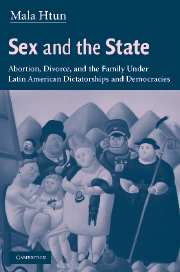 Sex and the State
Sex and the State Book contents
- Frontmatter
- Contents
- Acknowledgments
- Note on Translations
- 1 Sex and the State in Latin America
- 2 Four Normative Traditions
- 3 Reforming Women's Rights Under Military Dictatorships
- 4 Church and State in the Struggle for Divorce
- 5 Completing the Agenda: Family Equality and Democratic Politics
- 6 Why Hasn't Abortion Been Decriminalized in Latin America?
- 7 Conclusion
- References
- Index
3 - Reforming Women's Rights Under Military Dictatorships
Published online by Cambridge University Press: 08 January 2010
- Frontmatter
- Contents
- Acknowledgments
- Note on Translations
- 1 Sex and the State in Latin America
- 2 Four Normative Traditions
- 3 Reforming Women's Rights Under Military Dictatorships
- 4 Church and State in the Struggle for Divorce
- 5 Completing the Agenda: Family Equality and Democratic Politics
- 6 Why Hasn't Abortion Been Decriminalized in Latin America?
- 7 Conclusion
- References
- Index
Summary
In the 1960s and 1970s, military governments in Argentina, Brazil, and Chile launched efforts to modernize the civil law. In several cases, special commissions of experts debated and submitted proposals for reform on married women's civil status and property rights. Based on these expert recommendations, Argentina enacted major changes to women's civil and property rights under the military government of General Juan Carlos Onganía in 1968. Brazil, also under military rule, modified marital property law when a divorce law was approved in 1977. In Chile, experts working under the military government of Augusto Pinochet proposed similar changes, but the regime endorsed only a symbolic reform in 1989. By the late 1990s, Chile still had not implemented changes to the marital property regime introduced by the other two countries in 1968 and 1977. How could Latin American military governments, widely alleged to be patriarchal and conservative, make moves toward gender equality and democracy in the family? Why were many reforms achieved without pressure from feminist movements, the most conspicuous advocates of women's rights? Why has reform been so delayed in Chile, a country where women's literacy, incorporation into the labor force, and education levels have historically been the highest, or among the highest, in all of Latin America?
This chapter shows that the modernizing aspirations of military rulers opened a window of opportunity for small commissions of legal experts to craft liberal policy changes.
- Type
- Chapter
- Information
- Sex and the StateAbortion, Divorce, and the Family under Latin American Dictatorships and Democracies, pp. 58 - 77Publisher: Cambridge University PressPrint publication year: 2003


